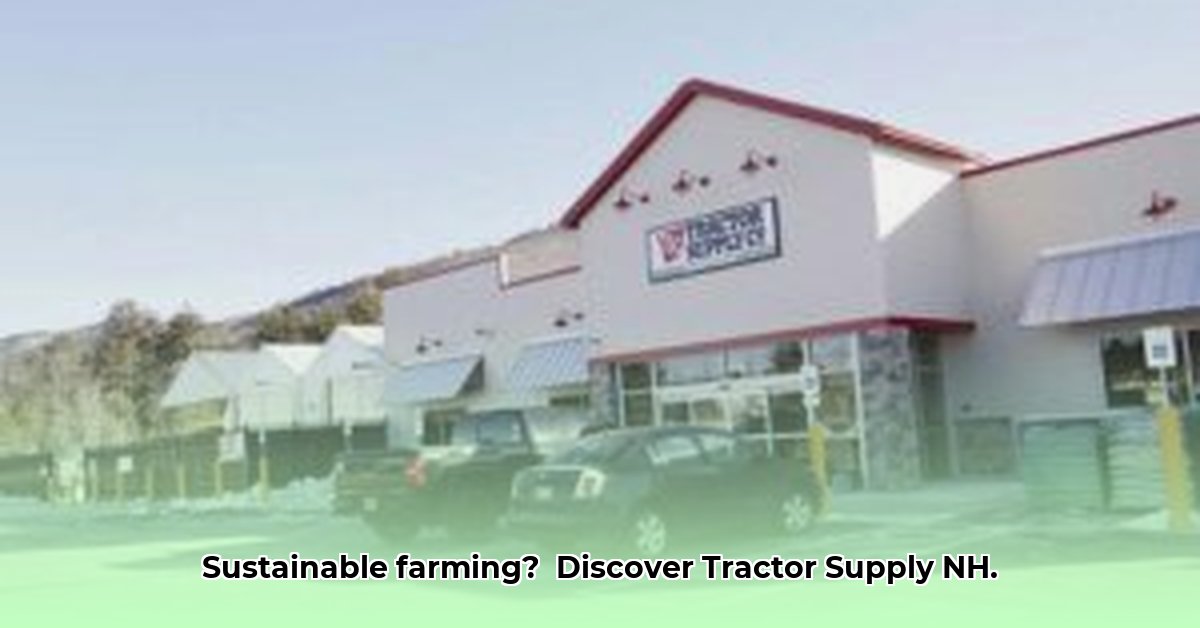
Tractor Supply North Conway: A Local Hub for Farmers and Gardeners
Tractor Supply Company (TSC) in North Conway, NH, located in the Mountain Valley Mall, serves as a crucial resource for local farmers and gardeners, providing a wide range of products from animal feed to gardening tools. However, its contribution to sustainable agriculture practices remains a complex issue requiring further investigation. The store's convenient location and accessible staff undeniably benefit the community, but a deeper analysis is needed to fully evaluate its impact on environmental sustainability. How can we determine if the convenience translates to environmentally responsible choices for North Conway farmers?
Supporting Sustainable Farming: Assessing the Impact
While TSC offers many products applicable to sustainable farming, a critical lack of transparency regarding their supply chains hinders a complete evaluation. Information on the sourcing of products, particularly the percentage of organic or locally sourced goods, is unavailable. This opacity makes it difficult to assess the true environmental impact of TSC's operations in North Conway. For example, the origin of their animal feed and the environmental friendliness of their fertilizers and pesticides are unknown, raising concerns about their overall sustainability. This lack of disclosure significantly limits our ability to evaluate their contribution to the region's ecological goals.
Opportunities for Improvement and Growth
The potential for positive impact is substantial. TSC could significantly increase its contribution to sustainable agriculture in North Conway. By partnering with local farmers to source supplies and providing educational resources focused on eco-friendly farming techniques, TSC could substantially improve its sustainability profile. Imagine the positive impact of empowering local farmers with knowledge and resources, leading to healthier lands and a stronger regional economy. How can Tractor Supply leverage its location and resources to foster a more sustainable agricultural future for North Conway?
A Roadmap to a Greener Future: Actionable Recommendations
The following recommendations outline achievable steps for all stakeholders to improve sustainable agriculture practices in the North Conway area:
Tractor Supply:
- Short-Term (0-1 Year): Implement clear in-store signage highlighting sustainable products; conduct customer surveys to gauge demand for eco-friendly options.
- Long-Term (3-5 Years): Partner with local sustainable farms to source products; establish a transparent system for tracking supply chains; host workshops and educational programs on sustainable farming practices.
Local Farmers:
- Short-Term (0-1 Year): Utilize Tractor Supply for convenient access to supplies while actively exploring collaborative sourcing options.
- Long-Term (3-5 Years): Advocate for a wider selection of organic products at TSC; collaborate with TSC on educational initiatives.
Consumers:
- Short-Term (0-1 Year): Actively seek out and purchase sustainable products; demand clear labeling and information on product origins.
- Long-Term (3-5 Years): Support local sustainable farms; encourage Tractor Supply to adopt more environmentally responsible practices.
Local Government:
- Short-Term (0-1 Year): Encourage Tractor Supply's participation in local sustainability initiatives; facilitate partnerships between TSC and local farmers.
- Long-Term (3-5 Years): Offer incentives to businesses promoting sustainable agriculture; support educational programs on sustainable farming methods.
This collaborative approach can transform Tractor Supply in North Conway into a leader in sustainable agriculture. The future of farming in the region hinges on such collaborative efforts; the store, local farmers, consumers, and local government all have a critical role to play.
How to Find Sustainable Farming Supplies Near North Conway, NH
Key Takeaways:
- Tractor Supply Company (TSC) offers various products relevant to sustainable farming in North Conway, but its overall contribution requires further examination.
- Consumer choices and the sourcing practices of TSC's suppliers are pivotal in determining its environmental impact.
- Increased transparency from TSC regarding its sustainability initiatives is crucial for fostering a sustainable agricultural ecosystem.